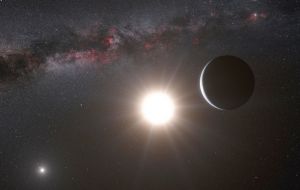MercoPress. South Atlantic News Agency
Astronomers working from Chile discover Earth ‘clone’ in ‘our backyard’
 However the new Earth-sized planet is 25 trillion miles away (Photo by AFP/Getty Images)
However the new Earth-sized planet is 25 trillion miles away (Photo by AFP/Getty Images) Astronomers have found a new planet, the closest yet outside our solar system and just an astronomical stone's throw away at four light years, raising the chances of finding a habitable planet in Earth's neighbourhood.
Researchers say the new planet is too close to its sun to support known forms of life, with a surface temperature estimated at 1,200 degrees Celsius. But previous studies suggest that when one planet is discovered orbiting a sun, there are usually others in the same system.
The new Earth-sized planet, announced in science Journal Nature by Stephane Udry and Xavier Dumusque at the Geneva Observatory, orbits one of the suns in Alpha Centauri, roughly 25 trillion miles away.
“It's a landmark discovery because it's very low mass and it's our closest neighbour,” said Udry. “Its orbit is very close to its star and it must be much too hot for life as we know it but it may well be just one planet in a system of several.”
Commenting on the find, University of California astronomer Greg Laughlin said: “This is our back yard, so to find out that planet formation occurred there is just extraordinary.”
Since the discovery of the first exoplanets - those outside our solar system - in the early 1990s, more than 800 have been found but this one is the closest to Earth.
Getting there is extremely unlikely in the foreseeable future. Laughlin estimates it would take about 40,000 years to travel to the new planet with current propulsion technology.
It was detected using the HARPS instrument on a telescope at the European Southern Observatory's La Silla site in Chile. The device is able to pick up tiny changes in the colour of the light coming from a host star as it wobbles under the gravitational influence of orbiting planets.




Top Comments
Disclaimer & comment rules-

-

-

Read all commentsWatch out, Argentina might claim sovereignty over it. They have a habit of claiming things that were discovered by others.
Oct 18th, 2012 - 09:02 pm 0But when we learn to bend space time the travel time will be instantaneous.
Oct 18th, 2012 - 09:09 pm 0its about six light years away, so they say.
Oct 18th, 2012 - 11:21 pm 0and even has a few sun;s.
but so far, NO argies or CFK agents have been found.
Commenting for this story is now closed.
If you have a Facebook account, become a fan and comment on our Facebook Page!